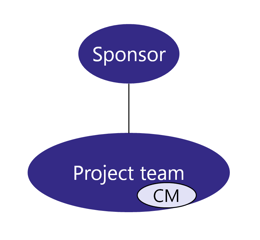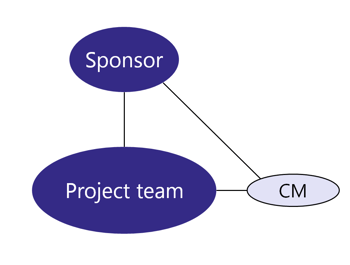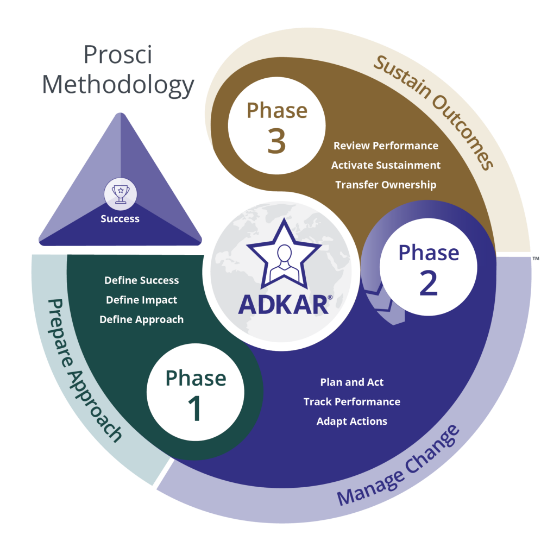How Internal Consultants Support Change Management

5 Mins
Updated: May 31, 2024
Published: August 23, 2018

Internal consultants play a unique role in driving successful change in organizations across the globe. Not only do they support the specific solution development and expertise—and sometimes the project management support—but they are often a key player in the change management activities that support project implementation.
This blog includes an overview of internal consulting and a look at how internal consultants support change management. The first part looks at the role of internal consultants, and the second part focuses on the role of internal consultants in supporting effective change management implementation.
Part 1: Understanding the Internal Consultant
By Dr. William Trotter, Former Managing Director of the Association of Internal Management Consultants)
What is an internal consultant?
Our working definition is that an internal consultant (IC) is any individual/group which serves internal clients in an advisory capacity, including:
- Bringing a specialized management consulting expertise to improve the performance of the company/organization
- Working within the corporate structure to resolve business issues and implement solutions in organizational effectiveness/development, strategic planning or process improvement
- Serving as a change agent, coach, educator or facilitator within your company
- Supporting internal clients in a shared service type organization, such as Human Resources, Training & Development, Information Technology, Finance, Quality Management, Health, Safety & Environmental Services, Competitive/Business Intelligence and Planning, etc.
My experience is that, of the total number of people in a company performing this function, there are only a small portion of them in formal internal consulting groups. Many formal IC groups have a combination of employees from various areas of the organization, either on a permanent or rotational basis, and external consultants hired into the group to bring their expertise and knowledge of how to provide the services needed. While some organizations do have formal internal consulting groups, there are many people fulfilling the role without the title. These individuals are often in HR, OD/OE, or Project Management Offices. Regardless of organizational affiliation, those performing internal consulting type services need core consulting skills, which the AIMC helps to develop.
Get Prosci Certified
Learn to manage change on a real organizational project when you attend the Prosci Change Management Certification Program.
What makes a good internal consultant?
Internal consultants need a combination of company/industry knowledge and core consulting skills. It is also helpful to have additional expertise in one or more key practice areas such as strategic/business planning and performance measurement, process management (including quality management and Six Sigma) or organizational effectiveness/development.
It is also important to understand the essential dynamics of managing a consulting type of organization.
The AIMC has developed a number of tools/frameworks to help organizations better manage IC services. The first is the IC Operations Model which provides key insights in the areas of: client relationship management, operating processes such as contracting, culture and people including staffing and development. This is linked to the IC Performance Measurement (Balanced Scorecard) System which provides key measurements in the financial, internal process, customer and innovation/learning areas to help ensure a balanced results focus. The next tool is the IC Competency Model. This has competencies for both individual contributors and IC leaders/managers, which will be linked to skill-building programs.
Individual contributors:
- Management consulting skills
- Client service focus
- Professional impact
- Change management
- Business acumen
- Coaching
- Project management
- Business process optimization
Leadership elements:
- Communicating vision
- Selecting, managing and developing others
- Decision making
- Team building
- Strategic business planning and implementation
- Managing cross-business-unit collaboration
Where organizations use internal consultants
Internal consultants are being used across the organization from corporate planning/business development to various human resources and other support/service functions.
Internal consulting has grown in part because organizations are trying to get more value from their overall “consulting spend.” This includes focusing more on implementation and continuous improvement in addition to more effectively transferring technology from external consultants to the organization. ICs are also often involved in negotiating external consulting contracts, teaming with external consultants on large projects and maintaining a roster of qualified consulting suppliers who can supplement their services in times of heavy or specialized demand.
One of the rapidly evolving growth areas in internal consulting is enterprise change management. Here, ICs are working with top levels in the organization to implement a consistent change methodology and build it into various activities throughout the firm, such as project management.
Part 2: How Internal Consultants Support
Change Management
By Tim Creasey, Chief Innovation Officer, Prosci
Internal consultants play an important role in managing the people side of change by applying structured change management tools and processes. Below are the two simplest and most common team structures for change management.
Team Structure 1: project team owns change management

Team Structure 2: internal consultant owns change management

Team structure 1 shows an existing member or group from the project team taking on the change management activities. Team structure 2 is the use of internal consultants, whether or not they have the title "Internal Consultant," to support a project team and sponsor on the change management front.
Many internal consultants learn change management by attending the Prosci Change Management Certification Program. These consultants tend to serve in a support role on projects in the organization, developing and delivering change management strategy and plans to internal clients. Often these individuals are formally HR consultants, communication specialists or OD consultants, or they're part of the project management office or a separate strategy or transformation staff. In some cases, organizations are formalizing the role of the change management office or the change management consultant.
The role of the internal consultant in supporting change management is threefold:
- Educate about change management
- Develop strategy and plans
- Enable the other "doers" of change management
Educate about change management
Internal consultants who support change management in an organization must answer two questions when working with other teams:
While the change management specialist has a full understanding of change management, what it means and what it looks like, many in the organization may not have the same perspective. For example, some might think change management is just communication. Others might think it is version control for IT hardware and software. Those with a background in project management might think it is the steps to follow when there is a change to project scope. Still others might think it is just holding a group therapy session where people can vent.
The first challenge is to accurately define change management for people in the organization as the tools, processes and practices for managing the people side of organizational change. Several other tutorials might help you in educating about the what and why of change management:
- What Is Change Management?
- Change Management ROI: Connecting People to Projects
- Why Change Management?
Develop strategy and plans
With Team Structure 2 from above, the internal consultants who support the project team are responsible for developing the change management strategy and plans. These activities are not done in a vacuum. The consultants must solicit input from the project team, the sponsor, impacted leaders and managers, and supervisors throughout the organization. For instance, when conducting change management readiness assessments, the internal consultant might interview a business leader from each impacted group in the organization. However, it is ultimately the internal consultant who captures and delivers the strategy and the subsequent plans.
The change management process in Prosci Methodology includes three phases:
- Phase 1 – Prepare Approach
- Phase 2 – Manage Change
- Phase 3 – Sustain Outcomes
 The action steps contained in each give the internal consultant guidelines on how to develop and present the strategy and plans. This Prosci Methodology overview provides a high-level description of the methodology.
The action steps contained in each give the internal consultant guidelines on how to develop and present the strategy and plans. This Prosci Methodology overview provides a high-level description of the methodology.
Enable the other "doers" of change management
The internal change management consultant has much of the responsibility for strategizing and planning the change management program, but there are a number of other "doers" who must implement the change management plans. As an illustration, participants in the Prosci's Best Practices in Change Management benchmarking studies were asked who they preferred to hear messages from regarding change. Resoundingly, there were two preferred senders of change messages.
First, employees want to hear from someone at the top of the organization about the business reasons for the change, e.g., why it is happening, what are the risks of not changing, why the change is happening now.
Second, employees want to hear from their direct supervisors about the personal impacts of the change, including how it will change impact to their day-to-day work. Employees do not want to hear from HR, a communications specialist, the project leader or the change management consultant. They want to hear from someone at the top and the person they report to.
 The role of the change management resource is to enable the preferred senders (senior business leader and managers/supervisors) to deliver these messages. They can segment the audience, create talking points, build presentations and even schedule communication events, but the messages should be delivered by the preferred sender.
The role of the change management resource is to enable the preferred senders (senior business leader and managers/supervisors) to deliver these messages. They can segment the audience, create talking points, build presentations and even schedule communication events, but the messages should be delivered by the preferred sender.
Learn More About Change Management
Internal consultants are essential for successful change in organizations around the world. They not only provide expert advice and project management expertise, but they can become a crucial link to ensure the successful implementation of change. Having a team of internal consultants on board with the necessary knowledge, skills and abilities is a must to ensure the success of any large-scale change initiative. Executives looking to implement major organizational changes—whether in terms of technological upgrades, process overhauls, or cultural shifts—will need reliable professionals who understand how to drive that change from inception to fruition.


